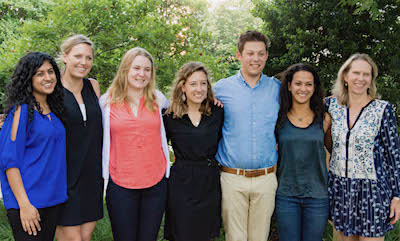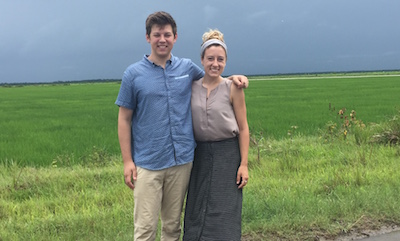Pulitzer Center Fellows Learn to Tell Global Health Stories.

Visiting NPR, the New York Times Washington bureau, the Washington Post, and Vox, Madeline Bishop says she and fellow MPH student Lauryn Claassen could barely contain their journalism-nerd excitement. “We were both saying to each other, ‘OK, keep it cool,’” Bishop says.
Bishop and Claassen were in Washington, DC, at the beginning of June to learn from the pros as they began their Global Health Storytelling fellowships with the Pulitzer Center on Crisis Reporting. For eight days, they took workshops with the Pulitzer Center’s staff and journalists to prepare for summers spent around the world, reporting on underreported global health crises.
Since 2011, SPH and the College of Communications have collaborated with the Pulitzer Center through BU’s Program for Global Health Storytelling, awarding fellowships to students at both SPH and COM. This year, Bishop and Claassen received fellowships along with COM students Campbell Rawlins and Erica Andersen.
At the Washington, DC, Pulitzer Center, the fellows went to workshops on topics including social media, photography—including taking quality photos on an iPhone—cybersecurity, safety, ethics and cultural sensitivity, and the ins and outs of effectively interviewing on tough and personal subjects.
Then they met with some of the leading health, science, and political reporters in the DC area. “The New York Times White House correspondent Julie Davis talked to us about reporting in the Trump era,” Bishop says. “The Vox health and science editor Eliza Barclay and reporters Julia Belluz and Brian Resnick broke down our topics and told us, ‘This is how we would approach this and that.’”
Bishop says the fellowship is one of the main reasons she came to SPH, soon after discovering public health. “One of the important things in public health is getting what we are doing out into the world,” she says. “I didn’t even know what public health was before two years ago.”
Statistics and data don’t bring about change without a story behind them, says Bishop, who is also a fellow at the SPH-based Public Health Post. The idea behind the Pulitzer fellowships “is to help journalists get better at writing about public health and to help public health people get better at writing about data and research,” she says.
That is the goal for her Pulitzer fellowship project with Rawlins from COM, who she met during the Boston Globe Spotlight editor’s visit to talk about mental health at SPH in February. From June 12 to July 1, Bishop and Rawlins were in Guyana, looking for the stories behind the world’s highest suicide rate. In the World Health Organization’s 2012 data, Bishop says, the tiny South American country of just 750,000 people had a suicide rate of 44.2 per 100,000 deaths, compared to the second-highest rate of 26 per 100,000 deaths in neighboring Suriname and a world average of 14 per 100,000 deaths. (The US rate in the report was 12.1 per 100,000 deaths.)
“Guyana isn’t the only country dealing with these issues,” Bishop says. “The world can learn many lessons about mental health reform and suicide prevention, even from a tiny country in the Caribbean.”

With their training from the Pulitzer Center, SPH, and COM, Bishop says she and Rawlins are now trying to raise the profile of Guyana’s overlooked suicide crisis. What Bishop learned about interviewing was especially valuable in talking to Guyanese about suicide and related issues like domestic violence and mental health, she says. “I was also trained in anthropology,” she says, and her own approach to these interviews would have followed a different, more restraining set of rules based on hard public health and qualitative research. “Instead, I was realizing that people were telling their stories because they wanted me to know, and wanted it to get out there,” she says.
There was also plenty to learn from working with a journalism student once they got to Guyana, she says, noting she and Rawlins originally teamed up because they felt the issue required both so much public health knowledge and also a high degree of storytelling finesse. Pulitzer fellows usually work alone, but Bishop says there was a clear advantage for the public health-journalism duo. After all, combining the skills of journalism and public health was the point of the fellowship in the first place.
Watch for articles on suicide in Guyana from Madeline Bishop in Public Health Post.
Pulitzer Center fellow Lauryn Claassen will be taking over the SPH Instagram account from August 7 through 11 to share photos from El Salvador. Follow along at Instagram.com/BUSPH/.